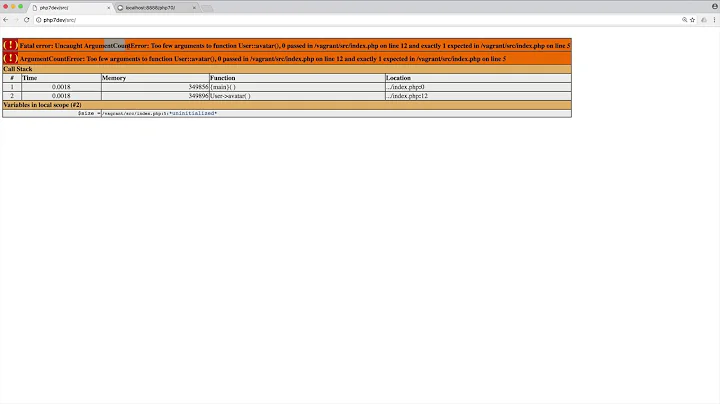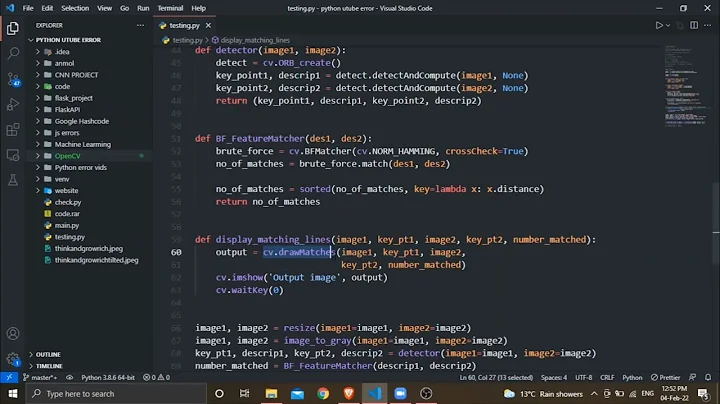find: missing argument to -exec
Solution 1
I figured it out now. When you need to run two commands in exec in a find you need to actually have two separate execs. This finally worked for me.
find . -type f -name "*.rm" -exec ffmpeg -i {} -sameq {}.mp3 \; -exec rm {} \;
Solution 2
A -exec command must be terminated with a ; (so you usually need to type \; or ';' to avoid interpretion by the shell) or a +. The difference is that with ;, the command is called once per file, with +, it is called just as few times as possible (usually once, but there is a maximum length for a command line, so it might be split up) with all filenames. See this example:
$ cat /tmp/echoargs
#!/bin/sh
echo $1 - $2 - $3
$ find /tmp/foo -exec /tmp/echoargs {} \;
/tmp/foo - -
/tmp/foo/one - -
/tmp/foo/two - -
$ find /tmp/foo -exec /tmp/echoargs {} +
/tmp/foo - /tmp/foo/one - /tmp/foo/two
Your command has two errors:
First, you use {};, but the ; must be a parameter of its own.
Second, the command ends at the &&. You specified “run find, and if that was successful, remove the file named {};.“. If you want to use shell stuff in the -exec command, you need to explicitly run it in a shell, such as -exec sh -c 'ffmpeg ... && rm'.
However you should not add the {} inside the bash command, it will produce problems when there are special characters. Instead, you can pass additional parameters to the shell after -c command_string (see man sh):
$ ls
$(echo damn.)
$ find * -exec sh -c 'echo "{}"' \;
damn.
$ find * -exec sh -c 'echo "$1"' - {} \;
$(echo damn.)
You see the $ thing is evaluated by the shell in the first example. Imagine there was a file called $(rm -rf /) :-)
(Side note: The - is not needed, but the first variable after the command is assigned to the variable $0, which is a special variable normally containing the name of the program being run and setting that to a parameter is a little unclean, though it won't cause any harm here probably, so we set that to just - and start with $1.)
So your command could be something like
find -exec bash -c 'ffmpeg -i "$1" -sameq "$1".mp3 && rm "$1".mp3' - {} \;
But there is a better way. find supports and and or, so you may do stuff like find -name foo -or -name bar. But that also works with -exec, which evaluates to true if the command exits successfully, and to false if not. See this example:
$ ls
false true
$ find * -exec {} \; -and -print
true
It only runs the print if the command was successfully, which it did for true but not for false.
So you can use two exec statements chained with an -and, and it will only execute the latter if the former was run successfully.
Solution 3
Try putting a space before each \;
Works:
find . -name "*.log" -exec echo {} \;
Doesn't Work:
find . -name "*.log" -exec echo {}\;
Solution 4
You have to put a space between {} and \;
So the command will be like:
find /home/me/download/ -type f -name "*.rm" -exec ffmpeg -i {} -sameq {}.mp3 && rm {} \;
Solution 5
Just for your information:
I have just tried using "find -exec" command on a Cygwin system (UNIX emulated on Windows), and there it seems that the backslash before the semicolon must be removed:
find ./ -name "blabla" -exec wc -l {} ;
Related videos on Youtube
Abs
Updated on April 16, 2022Comments
-
 Abs about 2 years
Abs about 2 yearsI was helped out today with a command, but it doesn't seem to be working. This is the command:
find /home/me/download/ -type f -name "*.rm" -exec ffmpeg -i {} -sameq {}.mp3 && rm {}\;The shell returns
find: missing argument to `-exec'What I am basically trying to do is go through a directory recursively (if it has other directories) and run the ffmpeg command on the
.rmfile types and convert them to.mp3file types. Once this is done, remove the.rmfile that has just been converted.I appreciate any help on this.
-
 jeyhun_mikayil about 2 yearsPut space before ' \ '
jeyhun_mikayil about 2 yearsPut space before ' \ '
-
-
 Abs about 14 yearsNot sure if it will get the variable of the file to delete? Anyone know if this is the case?
Abs about 14 yearsNot sure if it will get the variable of the file to delete? Anyone know if this is the case? -
 Abs about 14 yearsIf the first command in exec succeeds and the second command in exec is executed, will it still have access to the
Abs about 14 yearsIf the first command in exec succeeds and the second command in exec is executed, will it still have access to the{}variable to delete the right file? -
Marian about 14 yearsWhat do you thinik
{}expands to? Unless it contains two dots or commas that will stay as it is. -
Marian about 14 yearsTo test such things just add an
echobefore the commands and see what it does. -
pjammer over 10 yearsThe key seems to be Marian's line of "the ; is an arg on it's own" that is what did it for me, lightbulb wise and for my code sample. thanks.
-
harperville about 9 yearsThis trips me up quite often. One of these days, I'll add a space by default.
-
Eurospoofer over 8 yearsThat's about the best description i've read on -exec. It's extremely powerful but I always find it difficult to get the right syntax for it. This made a few things much clearer. Particularly wrapping the command in the separate shell. Nice. Thanks.
-
Kirby over 8 yearsI really confused.
find /etc/nginx -name '*.conf' -exec echo {} ;andfind /etc/nginx -name '*.conf' -exec echo {}\;gave the same result. :( -
gniourf_gniourf over 7 yearsNote that
-andand-orare not portable. POSIX specifies-aand-o, and in fact-ais always assumed (hence not needed). -
WebComer over 7 yearsFor me it works just the opposite in Cygwin under Windows 7: no space before\ ; works, with space - doesn't. But if i remove \, with space before ; it works, and without space before ; it doesn't, just the way it described here.
-
 mamacdon over 6 yearsI'm running the Bash shell that comes with Git for Windows, and Dustin Cowles' answer works for me. In other words: no quotes, backslash escaped by semicolon, space after
mamacdon over 6 yearsI'm running the Bash shell that comes with Git for Windows, and Dustin Cowles' answer works for me. In other words: no quotes, backslash escaped by semicolon, space after{}. -
Charles Duffy about 6 yearsThe
;not being quoted or escaped here means it can be consumed by the shell, not read byfind. Also,-fand- fare two different things. -
Charles Duffy about 6 years@Marian,
echois quite unreliable -- you can't tell the difference betweenecho "one argument"andecho one argument(the latter's output being false, as it's actually passingechotwo completely separate arguments). Much better to do something like-exec bash -c 'printf "%q " "$@"' _ ffmpeg -i {} -sameq {}.mp3 \; -printf '\n', which will print output in a way that makes nonprintable characters visible so you can detect DOS newlines and other oddities. -
 Dominique over 5 yearsThere's no difference in meaning, but in some cases you need to put the backslash, in some case you can't put it, and in again other cases you might choose.
Dominique over 5 yearsThere's no difference in meaning, but in some cases you need to put the backslash, in some case you can't put it, and in again other cases you might choose. -
 frmdstryr over 5 yearsAlso there must be a space before the terminator. Ex
frmdstryr over 5 yearsAlso there must be a space before the terminator. Ex"\;"doesn't work but" \;"does -
Snidhi Sofpro over 3 yearsFor the benefit of future readers who encounter this error with ssh, enclosing the terminating escaped-semicolon after the -exec resolved the issue(Ubuntu 18.04.2 LTS): $ ssh remuser@remhost find Documents -exec echo {} '\;'
-
Pysis almost 3 years
find: In ‘-exec ... {} +’ the ‘{}’ must appear by itself, but you specified ‘... {} ...’ -
cessor almost 3 yearsThank you so much, this was exactly my problem.








